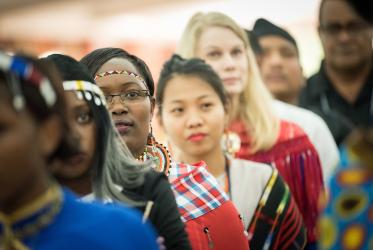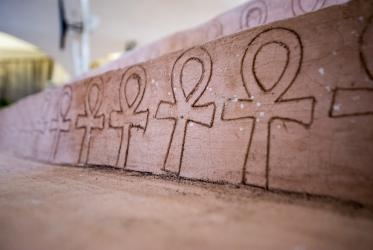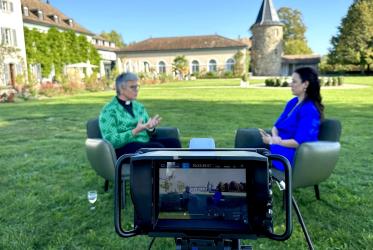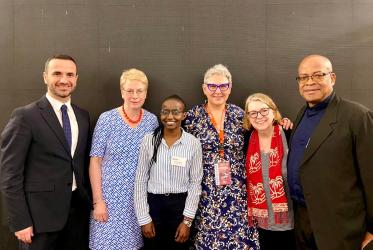The vision of Christian unity accompanied by respect for diversity has inspired this year’s prayer materials produced in Brazil for the Week of Prayer for Christian Unity. The drafting group, comprised of Brazilian churches, highlighted the value of Christian unity amid challenges of religious intolerance that now are growing around the world. The materials are co-published by the World Council of Churches (WCC) and the Pontifical Council for Christian Unity.
Traditionally celebrated between 18 and 25 January (in the northern hemisphere) or at Pentecost (in the southern hemisphere), this year’s week of prayer has brought into focus a theme based on the gospel of John (4:7): “Jesus said to her: ‘Give me to drink’”.
Preparing the prayer materials on request from the WCC Commission on Faith and Order in 2012 was both a challenge and an opportunity for the National Council of Churches of Brazil (CONIC). Led by the CONIC President Bishop Manoel João Francisco, from the Roman Catholic Church, and CONIC general secretary Rev. Romi Bencke, from the Evangelical Church of the Lutheran Confession in Brazil, the organization brought together a group of representatives from historical churches and ecumenical organizations from Brazil, including the Centre of Bible Studies (CEBI) and the Latin American Council of Churches (CLAI).
The first draft of the prayer materials was made by the working group chosen by CONIC. They met in February and March 2013 and completed their draft in July. The International Committee appointed by the WCC and the Pontifical Council met in September 2013 in Sao Paulo, Brazil, to finalize the materials.
“The meeting we had in Brazil between the national and the international committees, in a poor neighbourhood just outside the city of São Paulo, was a unique opportunity for the members of the international committee to have the experience of discovering the Brazilian reality and the challenges to Christian unity which cannot be understood as something apart from the ongoing increasing religious and cultural intolerance in Brazil,” said Dr Odair Pedroso Mateus, programme executive of the WCC’s Faith and Order Commission.
The theme for the week of prayer 2015 is inspired by the fourth chapter of the gospel of John, with a focus on the meeting of Jesus with the Samaritan woman at the well. This encounter is symbolic of love which has the power to diminish all separations based on religion, ethnicity or culture.
The biblical gesture of offering water to anyone who arrives, as a way of welcoming and sharing, is something repeated in all regions of Brazil. The proposed study and meditation on the story of Jesus meeting a Samaritan woman is to help people and communities realize the dialogical dimension of the project of Jesus, which we call the kingdom of God.
Religious contexts
The Brazilian drafting group’s work included Brazilian religious contexts, focusing on religious intolerance. “The choice of the biblical passage on Jesus and the Samaritan woman was made due to its strong meaning for the encounter of different cultures,” said Rev. Romi Bencke, CONIC general secretary. “We invited the CEBI to join us because of its method of popular reading of the Bible and to demonstrate a genuine Brazilian experience,” she added.
“We identify a great need to give a more concrete witness to Christian unity as a way to oppose situations of disrespect to other expressions of faith,” said Bencke.
“In Brazil, the growth of Christian fundamentalism is becoming an obstacle to the affirmation of a secular state,” said Edmilson Schinelo from the CEBI. “The violations of the rights of minorities, such as faced by the groups of practitioners of religions of African origin, often are presented as justified by a ‘religious’ discourse originating from intolerance,” he said.
Schinelo pointed out that the prayer materials aim to build dialogue among different faith expressions. “Dialogue is a permanent way of building peace among peoples, cultures and religions. Our thirst for peace and justice can also be quenched by drinking water that is being offered by others.”
The dates for the week of prayer were proposed in 1908 by Father Paul Watson, cofounder of the Society of the Atonement. January 18 to 25 covers the time between the feasts of St Peter and St Paul, and therefore bears a symbolic meaning. In the southern hemisphere, churches generally celebrate the week of prayer during the Pentecost period, which is a festival of the Church's unity. In Brazil, CONIC historically leads and coordinates celebrations of the week of prayer in several regions of the country.
CONIC was formed in 1982 and includes among its members the Roman Catholic Church, the Evangelical Church of the Lutheran Confession in Brazil (IECLB), the Episcopal Anglican Church of Brazil, the United Presbyterian Church and the Orthodox Church Syrian Antioch. The goals of CONIC are linked to the promotion and encouragement of ecumenical relations between Christian churches and strengthening of common witness in human rights advocacy.
Week of Prayer for Christian Unity 2015
WCC Commission on Faith and Order







